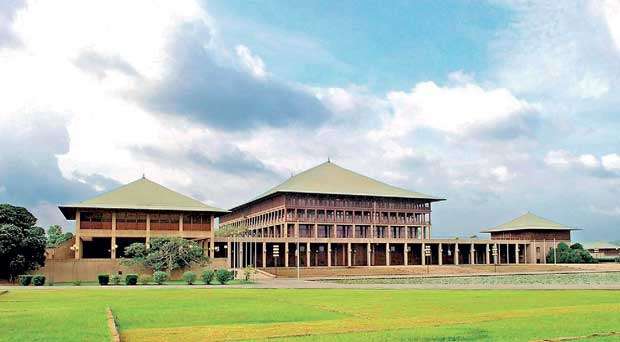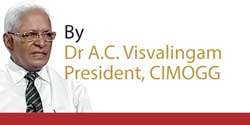Reply To:
Name - Reply Comment
Last Updated : 2024-05-10 19:01:00

 How often do we hear the desperate cry: “If only we could get some decent people into Parliament!”
How often do we hear the desperate cry: “If only we could get some decent people into Parliament!”
The lamentable fact is that, as long as we have undemocratic political parties of the types that we now have, there are no obvious means by which concerned citizens would be able to influence the central oligarchies of any of these parties to refrain from sponsoring crooked and incompetent persons as candidates’ for election.
Most Sri Lankans who have followed the politics of this country either by direct experience or by objective research of the relevant records would almost certainly agree with the assessment that, except for a few years of fairly responsible governance immediately after Independence, there has been a steady drop in the quality of the service provided by successive governments, with just a few bright spots here and there. The only indisputable areas of continual growth have been corruption and waste.
Our citizens know that the overall quality of the MPs elected over the past six decades has been badly wanting and deteriorating.
Their poor attendance and wasting of Parliamentary time in non-productive discussion and irrelevant personal attacks, instead of making constructive contributions to debates, can hardly be considered to be worthy of the billions of rupees that is spent by us annually on running the affairs of Parliament.
Moreover, Sri Lankan Parliaments have always been very lopsided because the legal profession is greatly over-represented at the expense of a more heterogeneous sampling of the population.
One sobering fact is that, though some candidates for election to Parliament may have a widely-accepted reputation for honesty before being voted in, too many of them, not long after being elected, set their scruples aside and put their hitherto relatively clean hands deep into the public till.
The most frequent excuse they have for this transformation into the ranks of the unprincipled is that they have to return the money that they had to “borrow” originally to fund their election campaigns. This defence is downright untruthful because no campaign financing is ever reimbursed.
The “repayment” is always made subsequently in kind by MPs (especially Ministers) by misusing the influence that goes with their position to extend commensurate favours to those who supported them financially or in kind.
Under the present party system, people have virtually no say regarding the candidates who are put forward to contest elections.
As mentioned in more than one previous article of ours over the past several years, it is the head of each political party and a coterie of self-serving henchmen, who generally decide on who shall be presented as the candidate of their particular party for a particular electorate or for the post of President.
This practice has now become so obnoxiously preposterous that, for example, former President Mahinda Rajapaksa has arrogated solely to himself the right to decide who his party would put forward as the candidate for the next Presidential Election and it is expected that almost every MP in the SLPP would shamelessly comply with his ‘decree’.
Looking at this phenomenon from another point of view, the five to six million voters who customarily voted for the SLFP (sic) are left with little option but to vote docilely for MR’s SLPP nominee or spoil their vote or stay at home or vote for the candidate of some other party.
The UNP is not much better. Instead of holding a secret Islandwide ballot of their electoral ‘leaders’ to vote on who they would like to put forward as their Presidential candidate, there is a self-sustaining cabal at Sirikotha that keeps on putting forward Ranil Wickremesinghe’s name or that of some other favoured person.
Once again, we see that the local leaders of the five to six million voters who usually vote for the UNP are left with not even a remote say regarding the selection of candidates for election.
To get this country back on a strictly straight and narrow course, we need to have a Constitution with features that will encourage those who want to help establish the Rule of Law and Good Governance to become MPs, either as independents or as party members chosen by a fair and transparent selection process.
However, if the framers of a new Constitution uncritically follow the common practice of adopting assorted features from the constitutions of other countries and prepare a Patchwork Document, the cure would turn out to be worse than the disease.
In a new Constitution, the separation of powers must be far more rigorous than the illusory separation allowed in the present Constitution.
A superior Constitution, worked out from first principles and enhanced by logically-consistent subsidiary laws that would provide for better selection of MPs and the establishment of reliable governance systems and procedures, with effective checks and balances, would go a long way to improve efficiency and cut down malversation.
What are the current norms to gain candidacy? Those who aspire to be their candidates must have most of the following ‘qualifications’.
They must be related to the party chief or his close associates. They need not possess any educational or professional qualifications but must belong to the right race, religion and caste to suit the respective electorates. They need not be able to speak more than one of the national languages. They should have the ability to persuade business leaders and other rich persons in their electorates and even outside to invest large sums of money anonymously in their election campaigns in return for future favours requiring political influence (especially from those candidates who may be expected to win ministerial positions). They must have the gift of the gab and the ability to lie convincingly. They should have no qualms about doing anything improper or even downright wrong for the benefit of their party leader. They should have cultivated and built up a group of local supporters who would be available not only to help during election campaigns but both before and after, inside and outside the law.
Could one expect anything more than mediocrity or criminality from the bulk of those who are chosen according to these criteria?
Going by what we have briefly outlined in the preceding paragraph, there are a few specific legislative controls that would help greatly to reduce the autocratic powers of party oligarchies and diminish drastically the need for large campaign funds.
(1) Voters at the periphery should be required, area by area, to elect to their own Citizens’ Committees (CitComs) persons who are well-respected locally. Aspiring CitCom members should be required to provide personal details, in a specified format, to substantiate their suitability to join the local CitCom. Whilst some black sheep would undoubtedly find a way of getting in, persons trusted by the local public would be bound to outnumber them.
(2) Political parties shall be obliged to nominate candidates to contest elections only if the latter are already members of CitComs.
(3) As corruption starts from the need for vast sums of money for campaigning, there shall be no pedestrian and motor-vehicle processions, meetings that cause disruption to the activities of the population, installation of huge hoardings, use of loudspeakers and so on, all of which would require a lot of funds acquired by present-day candidates twisting the arms of those with money or important business interests.
(4) Campaigning shall be by house-to-house visits during which the candidates will issue their personal data sheets to the householders.
(5) Campaigning at the Pradeshiya Sabha, Provincial Council and National levels can be done, without violence, noise and little expense by employing the CitCom members to form electoral colleges (much more representative than the US ones) to suit the level of election contemplated.
Item 5 in the above paragraph needs justification.
Most voters presently cast their ballots like automatons for candidates based solely on vague emotional considerations and not by comparing party policies on national issues.
Consequently, the utopian idea that one-voter- one-vote should apply indiscriminately to CitComs, Pradeshiya Sabhas, Provincial Councils and Parliament is just an exercise in academic self-delusion.
It stands to reason that if a thousand voters have elected ten members to a CitCom, the members of the CitCom would, on the whole, be very likely to be better informed on all aspects of governance and national priorities than the bulk of primary voters, who would ordinarily cast their ballots without studying any of the issues that would be relevant to the election concerned.
The unpalatable truth that we have to face is that very few of our representatives - past, current or future - will want to formulate a better Constitution such as the one we have indicated above because, if such a Constitution were to be enacted, most of them would not get past the CitCom level!
Unfortunately, the prospect of having such a Constitution would be feared so much by our politicians that there could be virtually no chance of it being written, or being adopted by a Sri Lankan Parliament.
Depressingly, we are left with the options of fuelling a revolution that would involve unmanageable violence or to determinedly carryon “chipping away” patiently and unremittingly at the foundations of the monstrous institution that now masquerades as the voice of the people.
Meanwhile, we should stop voting first for a party and then for the candidate. It would be far better to choose the best of the candidates put forward by the parties and then vote for the party of this candidate.
A fair chance should be given to promising candidates who are not lawyers.
About CIMOGG: The Citizens’ Movement for Good Governance (CIMOGG) was formed in 2002 and is a voluntary, non-political, non-profit organisation committed to promote the Rule of Law and Good Governance in Sri Lanka. acvisva@gmail.com and website cimogg-srilanka.org

Add comment
Comments will be edited (grammar, spelling and slang) and authorized at the discretion of Daily Mirror online. The website also has the right not to publish selected comments.
Reply To:
Name - Reply Comment
US authorities are currently reviewing the manifest of every cargo aboard MV
On March 26, a couple arriving from Thailand was arrested with 88 live animal
According to villagers from Naula-Moragolla out of 105 families 80 can afford
Is the situation in Sri Lanka so grim that locals harbour hope that they coul
10 May 2024
10 May 2024

22 minute ago
09 May 2024
09 May 2024